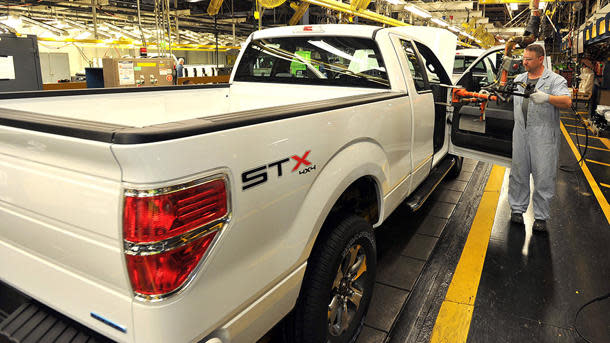 Motoramic
MotoramicFord revives 2,000 U.S. factory jobs, after cutting a few deals
Thanks to swelling demand for its F-Series pickups, Ford announced today it would add 900 jobs on a third shift at its Kansas City factory, and later in the year add an additional 1,100 jobs to launch production of the Ford Transit commercial van. Roughly half of the 2,000 new jobs will go to new hires — an impressive addition of workers by the Detroit automaker, which alone among its Michigan rivals does not import full-size pickups from Mexico.
But it didn't happen without some tough bargaining — and some help from those who will work the line.
While the national economy has been growing in fits and starts, a revived demand for construction jobs and lower gas prices has made pickups the fastest-growing segment among U.S. shoppers this year. Ford's F-Series sales have risen 19 percent through April, and Ford expects further gains for the remainder of the year.
By adding in the Transit van production, Ford estimates it and its local suppliers will spur a total of 18,000 jobs in the region. Missouri politicians and the UAW all hailed the move today; the jobs "serve as another reminder of the resilience of American workers and our nation's manufacturing sector," said Jimmy Settles, UAW vice president and director of the National Ford Department.
Yet three years ago, many of the same people praising Ford today were worried it would shut the plant down, and by doing so eliminate 2,750 jobs. That drove Missouri Gov. Jay Nixon, a Democrat, to push a package of tax breaks for Ford and other companies through the Republican-controlled state legislature. The factory had just lost production of the Ford Escape to Louisville after Kentucky ponied up its own tax incentives, and Ford had declined to say what its plans were for Kansas City or promise additional work.
That bill — nicknamed "the Ford bill" — sparked a 22-hour filibuster in the state legislature, but ultimately passed by a sizable margin. Thanks to it, Ford will offset some of the $1.1 billion its spending on factory upgrades in Kansas City with a tax incentive from the state of Missouri that could be worth $100 million over 10 years, along with an additional $50 million that suppliers can use.
The source of the money? The workers' own state withholding taxes, a portion of which Ford and its suppliers will be able to keep rather than sending to the Missouri treasury, a common way for states to give breaks to corporations in return for jobs. The UAW also gave Ford concessions in 2011 in return for a pledge of 5,750 new jobs over four years; the new hires at Kansas City will come in at a lower hourly wage — about $16 — than Ford previously paid, with a slower walk to future increases than what experience workers got. It's a case study of how in today's economy, preserving American manufacturing jobs often relies less on mechanical skills and more on financial engineering.

 Yahoo Autos
Yahoo Autos 
